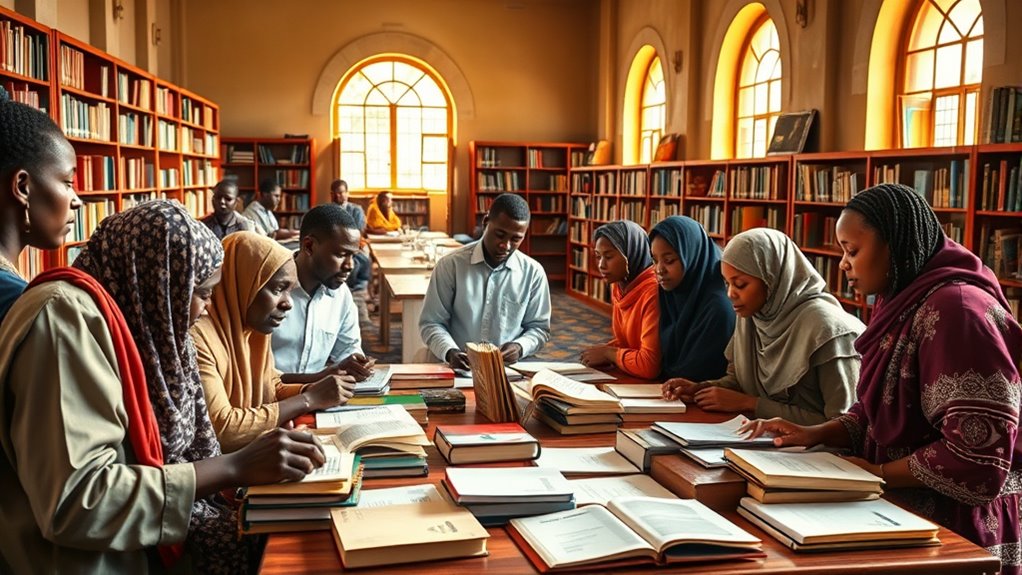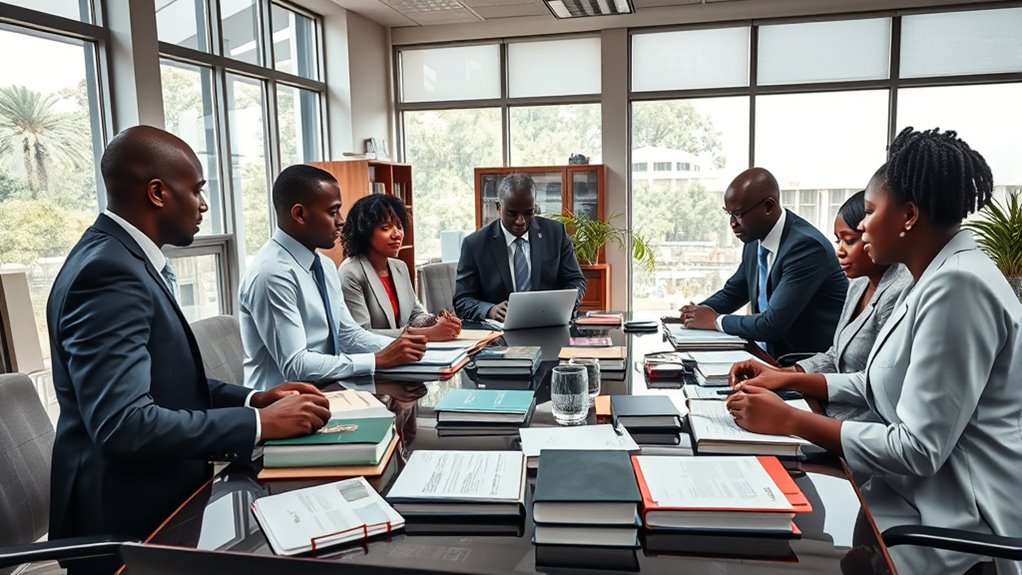Certified academic translation in Nigeria involves precise, verified rendering of documents like degrees, transcripts, theses, and research papers by certified linguists. Directline Translators offer expert services in languages such as English, Yoruba, Igbo, and Hausa, ensuring cultural accuracy and compliance with international standards. This process enhances educational access, supports global collaborations, and aids career growth for academics. Deeper exploration of services and benefits awaits in the content ahead.
Quick Summaries
- Directline Translators provides certified academic translations in Nigeria for documents like degrees, transcripts, theses, and research papers.
- Their services cover multiple language pairs, including English to Yoruba, Igbo, and Hausa, with expert linguists specializing in academic terminology.
- The translation process includes document analysis, expert translation, rigorous editing, and final verification for accuracy and cultural adaptation.
- Directline ensures high-quality standards through certified linguists, peer reviews, and adherence to ISO certifications for reliability and confidentiality.
- These translations facilitate global opportunities, such as university admissions, immigration applications, and international research collaborations for Nigerian academics.
What Is Certified Academic Translation?

Certified academic translation refers to the professional process of accurately translating academic documents, such as degrees, transcripts, and research papers, while obtaining official verification to guarantee their validity and compliance with standards. This process typically involves certified linguists or translation agencies adhering to international guidelines, guaranteeing linguistic accuracy and cultural appropriateness. Translators must possess expertise in both source and target languages, often backed by qualifications from recognized bodies. The verification step includes notarization or certification by authorities, confirming the document’s authenticity. In practice, it bridges language barriers for global academic mobility, focusing on precision to prevent misinterpretation. Key elements include maintaining original formatting, terminology consistency, and confidentiality protocols, all while meeting legal requirements for official use. This guarantees documents remain reliable for educational and professional purposes.
Importance of Translation in Nigerian Education

Translation plays a key role in Nigerian education by enhancing access to academic resources for diverse linguistic groups. It also promotes cultural integration, fostering understanding among Nigeria’s multilingual communities. These benefits underscore the broader impact of certified academic translation on educational equity.
Enhancing Educational Access
In Nigeria’s diverse linguistic landscape, translation serves as an essential bridge to educational equity, enabling students from non-English speaking backgrounds to access and engage with core curricula. By translating textbooks, lectures, and assessments into indigenous languages, barriers to comprehension are dismantled, allowing for broader participation in formal education. This accessibility empowers learners in remote regions to grasp scientific, mathematical, and literary concepts without language-induced confusion, thereby boosting enrollment and retention rates. Certified academic translation services, such as those offered by Directline Translators, guarantee high-fidelity renditions that maintain educational integrity. Consequently, students achieve higher academic performance, as translated materials facilitate independent study and exam preparation. This approach not only widens educational opportunities but also supports national development through an inclusive learning environment.
Promoting Cultural Integration
Beyond enhancing access, translation in Nigeria’s education system fosters cultural integration by incorporating indigenous languages into curricula, which preserves diverse ethnic identities and encourages mutual understanding among students. This approach bridges gaps between ethnic groups, enriching educational experiences and promoting a cohesive society.
- Preserves heritage: Translation maintains traditional stories and knowledge, ensuring cultural legacies endure in modern education.
- Enhances empathy: Students learn to appreciate diverse perspectives, reducing stereotypes and fostering respect.
- Facilitates collaboration: It enables group projects across linguistic barriers, building teamwork in multicultural settings.
- Supports inclusivity: By making materials accessible, translation creates equitable learning environments for all ethnic backgrounds.
Services Offered by Directline Translators

Directline Translators delivers a variety of certified academic translation services tailored to clients in Nigeria. These encompass precise translation of academic documents such as theses, research papers, dissertations, and educational certificates. The company offers expertise in multiple language pairs, including English to major Nigerian languages like Yoruba, Igbo, and Hausa, as well as international languages for global accessibility. Services include document certification to guarantee authenticity and compliance with academic standards. Directline employs skilled linguists who specialize in academic terminology, providing accurate renditions for institutions and individuals. They also handle specialized formats, such as technical reports and manuscripts, with attention to detail. Additionally, the firm supports transcription and adaptation services, maintaining the original intent without alteration. This range caters to diverse academic needs across Nigeria’s educational landscape.
Benefits for Academic Professionals
Certified academic translation services in Nigeria offer academic professionals enhanced access to research materials, enabling broader exploration of global knowledge. These services also create career advancement opportunities by supporting international publications and collaborations. As a result, such benefits foster greater professional growth within the academic community.
Enhanced Research Access
Enhanced research access through certified academic translation greatly benefits academic professionals in Nigeria by facilitating global collaboration and overcoming language barriers in scholarly work. This service bridges gaps in knowledge exchange, allowing scholars to integrate international findings into local projects and foster innovative research environments. By providing accurate, reliable translations, it guarantees that Nigerian academics can engage with diverse global resources without distortion.
The key benefits include:
- Expanded access to international journals and databases, enabling scholars to explore cutting-edge studies in their fields.
- Facilitation of cross-border data sharing, which supports collaborative projects and enriches research methodologies.
- Integration of multilingual resources, allowing for thorough literature reviews and deeper analytical insights.
- Promotion of inclusive scholarly networks, where Nigerian professionals can contribute to and draw from global discussions effectively.
Career Advancement Opportunities
Academic professionals in Nigeria leverage certified translation services to accelerate career advancement, gaining access to international job markets, publication opportunities, and collaborative networks that enhance their professional profiles. This process allows them to present research globally, secure funding, and expand their expertise, ultimately leading to promotions and leadership roles. Certified translations validate credentials for overseas positions, enabling participation in prestigious conferences and co-authorship in international journals. By bridging language barriers, these services foster innovation and professional growth, making academics more competitive.
| Career Opportunity | Key Benefit | Real-World Impact |
|---|---|---|
| International Job Markets | Global Exposure | Access to high-profile roles abroad |
| Publication Opportunities | Enhanced Visibility | Features in top-tier journals |
| Collaborative Networks | Expanded Partnerships | Joint projects with experts worldwide |
| Conference Participation | Skill Development | Presentations at global events |
| Grant Applications | Funding Access | Securing international research funds |
Types of Documents for Translation
In Nigeria, translation services for certified academic purposes commonly involve a variety of documents, such as academic transcripts, diplomas, theses, and research papers, each requiring precise handling to maintain authenticity and compliance with local standards.
These documents play key roles in academic and professional contexts. Here are four common types:
- Academic transcripts: These detail coursework and grades, essential for university applications or job verifications, helping individuals showcase their educational journey.
- Diplomas: Certificates confirming degree completion, often needed for immigration or further studies, enabling access to global opportunities.
- Theses: In-depth research works translated for international conferences or publications, fostering scholarly exchange across borders.
- Research papers: Articles from journals or projects, vital for collaborations, allowing Nigerian scholars to contribute to worldwide discussions.
Ensuring High-Quality Translations
Maintaining the authenticity of academic documents like transcripts and diplomas hinges on effective quality controls in translation. Directline Translators, a leading provider in Nigeria, employs certified linguists with specialized academic expertise to guarantee precision and cultural accuracy. Rigorous editing processes, including peer reviews and terminology verification, minimize errors and uphold document integrity. The firm adheres to international standards, such as ISO certifications, to maintain confidentiality and reliability. By integrating advanced translation tools, they enhance consistency while preserving the original intent. This commitment to quality not only meets regulatory requirements in Nigeria but also builds trust among clients seeking flawless academic translations. Ultimately, these measures safeguard the value and credibility of translated materials in educational and professional contexts.
The Translation Process Step-by-Step
The translation process at Directline Translators unfolds in a series of structured steps to deliver accurate academic documents. This methodical approach guarantees efficiency and reliability for clients in Nigeria, focusing on seamless handling of academic materials like theses and research papers.
- Document Intake and Analysis: The team begins by reviewing the source document, identifying key terminology, and evaluating context to tailor the translation strategy.
- Expert Translation: Qualified linguists with academic backgrounds translate the content, maintaining original meaning while adapting to cultural nuances for Nigerian audiences.
- Editing and Review: A second specialist edits the work, checking for accuracy, fluency, and consistency to refine the translation.
- Final Verification and Delivery: The document undergoes a quality assurance check before secure delivery, guaranteeing it meets client expectations promptly.
Accuracy Standards in Academic Work
Accuracy standards in academic work form the foundation of certified translations in Nigeria, where defining standards involves establishing clear criteria for fidelity to original texts. Ensuring precision requires rigorous checks to maintain the integrity and meaning of scholarly content. These elements collectively uphold the reliability of translations in educational and professional contexts.
Defining Standards
Defining accuracy standards in academic work requires a structured approach, particularly in fields like certified academic translation in Nigeria, where precision prevents misinterpretation and upholds scholarly integrity. In this regard, standards involve setting benchmarks for reliability and excellence. They guarantee translations align with academic norms, fostering trust in educational exchanges.
To make these standards relatable, consider the following:
- Establishing terminology guidelines: Define precise vocabularies to maintain consistency across documents.
- Adopting verification protocols: Use peer reviews to confirm factual accuracy before finalization.
- Integrating cultural adaptations: Adjust nuances to preserve original intent without altering core meanings.
- Complying with regulatory frameworks: Align with Nigerian and international academic policies for legitimacy.
This framework supports robust scholarly practices in translation services.
Ensuring Precision
Guaranteeing precision in academic translations demands adherence to rigorous accuracy standards, particularly in Nigeria’s certified services, where even minor errors can compromise scholarly integrity and global collaboration. Directline Translators guarantees this through a multi-layered approach: employing certified linguists with academic expertise, conducting thorough fact-checking, and utilizing peer verification. This method guarantees translations are linguistically correct and contextually appropriate, preserving original intent and meaning. In Nigeria’s diverse linguistic environment, precision prevents miscommunications that could distort research outcomes. Adherence to international standards, such as those from the ISO or American Translators Association, enhances global acceptability. Advanced translation software supports consistency, while human oversight guarantees no details are overlooked. Ultimately, these practices uphold academic reliability, facilitating seamless knowledge sharing and fostering trust in scholarly work.
Why Choose Directline for Your Needs
When considering certified academic translation services in Nigeria, Directline stands out due to its established expertise, rigorous quality controls, and adherence to international standards, making it a reliable option for clients seeking precision and efficiency. Directline’s team comprises highly skilled linguists with deep knowledge of academic contexts, ensuring accurate and culturally sensitive translations. This focus on excellence extends to seamless project management and client support.
Here are key reasons to select Directline:
- Proven Expertise: A team of certified translators with years of experience in academic fields, delivering flawless results.
- Stringent Quality Controls: Multi-step review processes that minimize errors and uphold accuracy.
- Adherence to Standards: Full compliance with global certification bodies, guaranteeing professional integrity.
- Client-Centric Approach: Personalized services that prioritize timely delivery and clear communication for a stress-free experience.
Real-World Applications in Nigeria
In Nigeria, Directline’s certified academic translation services play a key role in sectors such as education, immigration, and international research, where accurate document handling supports university admissions, visa applications, and scholarly collaborations. These services enable seamless cross-border interactions, helping students access foreign scholarships and professionals engage in global networks. For instance, translated diplomas aid educational mobility, while research papers foster partnerships with international institutions. This precision minimizes errors that could hinder opportunities, promoting economic and academic growth.
| Sector | Application | Benefit |
|---|---|---|
| Education | University admissions | Facilitates global study access |
| Immigration | Visa processes | Guarantees compliance and approval |
| Research | Scholarly collaborations | Enhances knowledge exchange |
| Business | Corporate certifications | Supports international trade |
| Healthcare | Medical document sharing | Improves global health standards |
Preparing Your Documents Effectively
Effective document preparation is essential for achieving accurate certified academic translations. It guarantees that translators can capture the original intent without ambiguity, particularly in academic contexts where precision matters. Well-prepared documents facilitate smoother processes and reduce potential errors in Nigeria’s translation landscape.
- Organize materials logically: Group related pages or sections to aid comprehension and flow.
- Guarantee legibility: Use clear fonts, avoid handwritten notes, and scan documents at high resolution for clarity.
- Remove irrelevant content: Strip away unrelated annotations or duplicates to focus on core information.
- Provide context where needed: Include glossaries or explanations for specialized terms to enhance accuracy.
This approach streamlines the translation process, making it more efficient and reliable.
Cost and Value of Translation Services
Understanding the cost and value of translation services in Nigeria involves evaluating factors like pricing structures and service quality. Pricing often varies based on document complexity, word count, and language pairs, with services typically charged per word or page. For instance, academic translations may incur higher fees due to the need for specialized expertise and certification to guarantee accuracy and compliance with international standards. The value lies in delivering precise, culturally appropriate renditions that prevent miscommunication in educational or professional contexts. High-quality services from reputable providers enhance credibility, potentially saving users from costly errors or reworks. Ultimately, investing in reliable translation yields long-term benefits, such as improved global opportunities for Nigerian academics and businesses, outweighing initial expenses through dependable results. (124 words)
Collaborating With Directline Translators
Collaborating with Directline Translators enables seamless academic translation projects in Nigeria by leveraging their expertise in certified services. This collaboration streamlines processes for universities, researchers, and businesses, ensuring precise handling of academic documents while meeting global standards. Directline’s professional approach minimizes errors and enhances communication across languages.
- Expertise in academic fields: Translators possess specialized knowledge in subjects like science and humanities.
- Streamlined project workflow: Clients receive dedicated support from inquiry to final delivery.
- Quality assurance protocols: Every translation undergoes rigorous checks for accuracy and certification.
- Flexible and scalable services: Options range from small assignments to large-scale projects, adapting to client needs.
Frequently Asked Questions
How Long Does Translation Typically Take?
The time required for translation typically varies based on factors like document length, complexity, and language pair. Simple texts may take a few hours, while extensive projects often require several days to weeks, depending on resources.
Which Languages Do You Support?
The question of which languages are supported by translation services often arises. Various providers typically handle major global languages such as English, French, Spanish, Arabic, Chinese, and many others, depending on expertise.
Do You Offer Rush Services?
The query regarding rush services inquires if expedited options are offered. It is confirmed that yes, rush services are available for translation work, allowing clients to receive results faster without compromising on quality or accuracy.
What Payment Methods Are Accepted?
The current question addresses the accepted payment methods for services. These typically include major credit cards like Visa and Mastercard, bank transfers, and digital options such as PayPal. Users should verify details directly with the provider for accuracy and updates.
How Can I Track My Order?
To track an order, one must visit the designated website’s tracking section and enter the provided order identifier. This enables viewing of current status, processing stages, and estimated completion times. Users can also contact support for updates, ensuring efficient monitoring.



